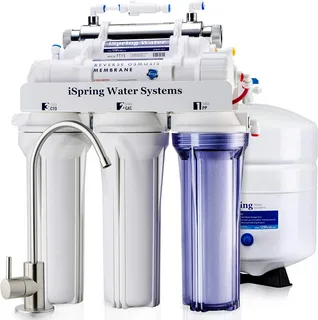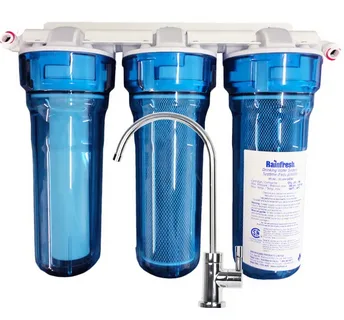Are you concerned about the quality of the water your family is drinking? If so, you may want to consider investing in a home water purifier. These purifiers can help to ensure that the water your family is consuming is free from contaminants and is safe to drink. In this blog post, we’ll explore the importance of using a water purifier for home to protect your family’s health and well-being. We’ll look at the different types of purifiers, their benefits, and how to choose the best one for your home.
What Is In Your Tap Water?
When you turn on your faucet and fill up a glass with water, it’s easy to assume that it’s safe for consumption. However, tap water is often treated with chemicals like chlorine and fluoride to make it safe for drinking. Unfortunately, there are still contaminants that can make their way into our tap water.
Common contaminants found in tap water include lead, arsenic, pesticides, bacteria, and viruses. Some of these contaminants can have serious health consequences, such as lead poisoning and cancer. In addition to health risks, these contaminants can also affect the taste and odor of your drinking water.
This is where a home water purifier can help. By filtering out these contaminants, a water purifier can provide you with clean, safe, and great-tasting drinking water. So, if you’re concerned about the quality of your tap water, it’s worth considering investing in a home water purifier.
Health Risks Associated With Tap Water
Tap water is treated by municipal facilities to make it safe for consumption. However, despite the treatment process, tap water can still contain harmful contaminants, chemicals, and minerals that pose health risks to you and your family. Some of the health risks associated with drinking contaminated tap water include:
- Gastrointestinal Illnesses: Bacteria like E.coli and Salmonella can enter tap water through leaks in pipes or poorly maintained treatment facilities, leading to gastrointestinal illnesses like diarrhea and vomiting.
- Chronic Diseases: Exposure to certain contaminants like lead and arsenic, even in low concentrations, can increase the risk of chronic diseases like cancer and neurological disorders.
- Developmental Issues: Exposure to contaminants like nitrates, which can seep into the water from agricultural runoff, can cause developmental issues in infants and children.
- Reproductive Issues: Exposure to certain chemicals and heavy metals found in tap water can affect fertility, pregnancy outcomes, and the reproductive systems of both men and women.
These health risks make it necessary to take measures to ensure the safety of your tap water, and one effective way to do so is by installing a home water purifier.
Advantages Of A Water Filter Machine
Investing in a home water filter machine has numerous advantages for you and your family. The most obvious advantage is that it provides you with clean and safe drinking water. A water purifier removes contaminants like lead, chlorine, pesticides, and bacteria, making the water taste better and reducing health risks.
Another advantage of using a water machine is that it saves you money in the long run. Bottled water may seem like an affordable option, but over time, the costs add up. With a water purifier, you can have access to unlimited clean water without having to spend money on plastic bottles.
Moreover, using a water machine helps reduce the environmental impact of plastic waste. Every year, billions of plastic water bottles end up in landfills and oceans, contributing to pollution and endangering wildlife. By switching to a water purifier, you can do your part in reducing your carbon footprint and protecting the environment.
Lastly, using a water machine is convenient. You no longer have to worry about running out of bottled water or scheduling water deliveries. A water purifier can provide you with clean water anytime you need it, whether you’re at home or at the office.
Overall, investing in a water machine is a wise decision that offers several advantages, including cost savings, environmental benefits, convenience, and most importantly, clean and safe drinking water for you and your family.
Types Of Drinking Water Filter
When it comes to selecting a drinking water filter for your home, you have a range of options to choose from. Different types of water filters are available in the market, and you can select the one that suits your specific needs.
Here are some common types of water filters that you may consider for your home:
- Activated carbon filter: This filter removes chlorine, pesticides, herbicides, and other chemicals. It is relatively inexpensive and easy to install.
- Reverse osmosis filter: It is a more complex filter that uses a semi-permeable membrane to remove contaminants such as arsenic, fluoride, lead, and nitrates. This filter requires professional installation and maintenance.
- Ultraviolet (UV) filter: This filter uses UV radiation to kill bacteria, viruses, and other microorganisms. It is easy to install and requires minimal maintenance.
- Ceramic filter: It is a natural and eco-friendly option that removes bacteria and other contaminants. It requires minimal maintenance and is relatively affordable.
- Ion exchange filter: This filter removes hard water minerals such as calcium and magnesium. It is often used in conjunction with other filters.
Each of these filters has its benefits and drawbacks. You should choose a water purifier based on your budget, the contaminants in your water, and your family’s specific needs. Consult a professional for advice on selecting the most suitable water filter for your home.
Factors To Consider When Choosing A House Water Filter
When selecting a house water filter, it’s important to consider a few factors to ensure that you get the right one for your specific needs. Here are some things to keep in mind:
- Contaminant Removal: Determine what types of contaminants are present in your tap water. This will help you choose a filter that is designed to remove those specific contaminants.
- Filter Type: There are several types of water filters available, including carbon filters, reverse osmosis filters, and UV filters. Consider which type of filter will best meet your needs.
- Flow Rate: Make sure that the water filter you select has a high enough flow rate to meet your household’s needs. A slow flow rate can be frustrating and inconvenient.
- Installation: Consider how easy or difficult it will be to install the water filter. If you’re not handy, you may want to opt for a filter that is easy to install without the need for professional help.
- Filter Lifespan: Pay attention to the lifespan of the filter. How often will it need to be replaced, and how easy is it to do so? Consider the ongoing maintenance requirements when making your decision.
By considering these factors, you can choose a water filter that will provide your family with safe and healthy drinking water for years to come.
Maintenance Of A Water Purifier Filter
Just like any other household appliance, a water purifier filter requires regular maintenance to ensure its efficiency. Here are some maintenance tips to keep your water filter working at its best:
- Change the filter cartridges: The filter cartridges need to be replaced every 6 to 12 months, depending on the manufacturer’s recommendations. You can easily replace the filter cartridges on your own, or you can seek the help of a professional.
- Clean the filter housing: Over time, the filter housing can accumulate dirt and debris. It’s important to clean the housing periodically to maintain the flow of water. Use a soft cloth to wipe the housing clean.
- Check for leaks: Check the water filter periodically for any leaks or drips. If you notice any leaks, it’s best to contact a professional for repairs.
- Follow manufacturer’s instructions: Always follow the manufacturer’s instructions when it comes to maintenance and replacement of parts. This will ensure the longevity of your water filter.
By maintaining your water filter, you can ensure that your family is getting clean and safe drinking water. Plus, it can help save you money in the long run by avoiding costly repairs or replacements.
FAQs
No water purifier can remove 100% of all contaminants from tap water. However, some models are better at removing specific contaminants, so it’s important to choose a filter that targets the pollutants that are most prevalent in your water supply.
The frequency with which you should replace your water filter depends on the model you use and the quality of your tap water. In general, most filters need to be replaced every 6 to 12 months, but some models may last longer.
The cost of a water purifier varies depending on the type and model you choose. However, the initial cost is typically offset 1. Can a water purifier remove all contaminants from my tap water?
2. How often should I replace my water filter?
3. Are water purifiers expensive?
4. Can a water purifier help with hard water?
5. Can I install a water purifier myself?
by the savings you’ll enjoy from not having to buy bottled water.
Most water purifiers aren’t designed to remove minerals that cause hard water. However, some models have additional filters that can help soften hard water, so it’s important to check the specifications before making a purchase.
Most water purifiers come with detailed instructions and can be installed by homeowners with basic plumbing skills. However, if you’re unsure about the installation process, it’s best to consult with a professional plumber.
Conclusion
Overall, the benefits of having a home water purifier cannot be overstated. With the increased awareness of the potential health risks associated with tap water, investing in a water machine is a smart decision to make for the health and well-being of your family.
There are different types of drinking water machines available in the market that cater to varying needs and budgets. Whether it’s a simple pitcher filter or a more advanced reverse osmosis system, the choice depends on several factors such as the size of your household, the quality of your tap water, and your water consumption needs.



